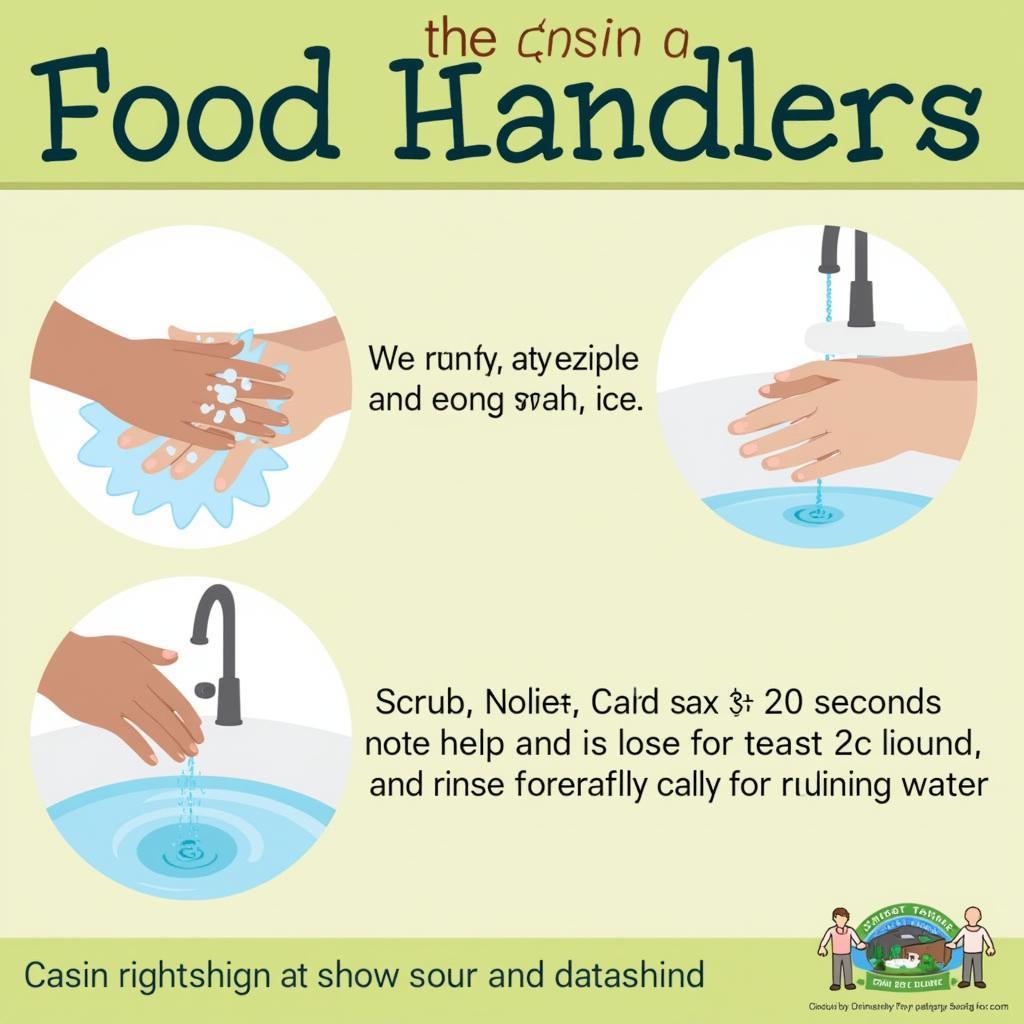Getting your North Carolina Food Handlers Permit is a crucial step for anyone working in the food service industry. Whether you’re flipping burgers, serving ice cream, or preparing gourmet meals, this permit demonstrates your commitment to food safety and protects the public from foodborne illnesses. This guide will walk you through everything you need to know about obtaining and maintaining your North Carolina food handlers permit.
Why You Need a North Carolina Food Handlers Permit
Foodborne illnesses are a serious public health concern. A food handler’s permit ensures that individuals working with food understand the proper procedures for handling, storing, and preparing food safely. This helps minimize the risk of contamination and protects consumers. In North Carolina, this permit is typically required for anyone who works in a role that involves handling food, including restaurant employees, caterers, and food truck operators. Having a valid permit isn’t just good practice; it’s often a legal requirement. Failing to comply with these regulations can result in fines and penalties for both the individual and the establishment.
 Food Handler Working in a North Carolina Restaurant
Food Handler Working in a North Carolina Restaurant
How to Get Your Food Handlers Permit in North Carolina
Obtaining your North Carolina food handlers permit is a straightforward process. You’ll need to complete an accredited food handler training program and pass an exam. These programs cover essential topics like personal hygiene, safe food handling practices, temperature control, and preventing cross-contamination. Many online and in-person training options are available, allowing you to choose the format that best suits your needs and schedule. Once you’ve successfully completed the training, you’ll receive your food handler’s permit, which is usually valid for a specific period and requires renewal. Remember to check the specific requirements of your county as regulations may vary slightly.
You can find resources and information about the food handlers license nc on our website.
Key Food Safety Practices for North Carolina Food Handlers
Even after obtaining your permit, staying informed about current food safety practices is essential. Regularly reviewing key concepts helps ensure you’re maintaining the highest standards of hygiene and food safety. This includes frequent handwashing, using gloves when handling food, properly storing food at safe temperatures, and preventing cross-contamination between raw and cooked foods. By adhering to these guidelines, you contribute to a safer dining experience for everyone.
 Proper Handwashing Technique for Food Handlers
Proper Handwashing Technique for Food Handlers
Are you looking for resources in Spanish? Check out our food handlers Texas en espanol resources.
Navigating Food Handler Regulations in Different Counties
While the core requirements for a North Carolina food handlers permit are generally consistent across the state, some variations may exist between counties. It’s crucial to be aware of the specific regulations in your area to ensure full compliance. Checking with your local health department is a great way to stay updated on any county-specific requirements or changes to the existing regulations. This proactive approach helps avoid potential issues and maintains a safe and compliant food service environment. For example, some counties may have specific requirements for food handler training programs or different renewal periods for permits.
Tips for Maintaining Your North Carolina Food Handlers Permit
Keeping your North Carolina food handlers permit valid is an ongoing responsibility. Be sure to track the expiration date of your permit and renew it promptly. Regularly refreshing your knowledge of food safety practices through refresher courses or online resources is also a good idea. This ensures you’re always up-to-date on the latest information and best practices, further enhancing your commitment to food safety. This commitment not only protects your customers but also contributes to a positive reputation for your establishment.
 Renewing Your North Carolina Food Handler's Permit
Renewing Your North Carolina Food Handler's Permit
Do you need your food handler’s card in Spanish? We have information about a food handlers card en español.
Conclusion
Obtaining and maintaining your North Carolina food handlers permit is a vital part of working in the food service industry. By prioritizing food safety, you demonstrate your commitment to protecting public health and ensuring a safe dining experience for everyone. Stay informed, stay compliant, and contribute to a healthier community through responsible food handling practices.
FAQ
- How long is a North Carolina food handlers permit valid? This varies by county, so check with your local health department.
- Where can I take a food handler training course? Many online and in-person options are available. Check with your local health department for approved providers.
- What happens if my permit expires? You’ll need to renew it before you can continue working with food.
- Is the exam difficult? The exam focuses on basic food safety principles covered in the training.
- What are the penalties for working without a permit? Fines and penalties can be imposed on both the individual and the establishment.
- Can I use my North Carolina permit in another state? Reciprocity varies by state, so you may need to obtain a new permit if you relocate.
- Where can I find more information about specific regulations in my county? Contact your local health department for the most accurate and up-to-date information.
Need further assistance? Contact us! Phone: 02437655121, Email: [email protected] or visit us at 3PGH+8R9, ĐT70A, thôn Trung, Bắc Từ Liêm, Hà Nội, Việt Nam. We have a 24/7 customer service team.